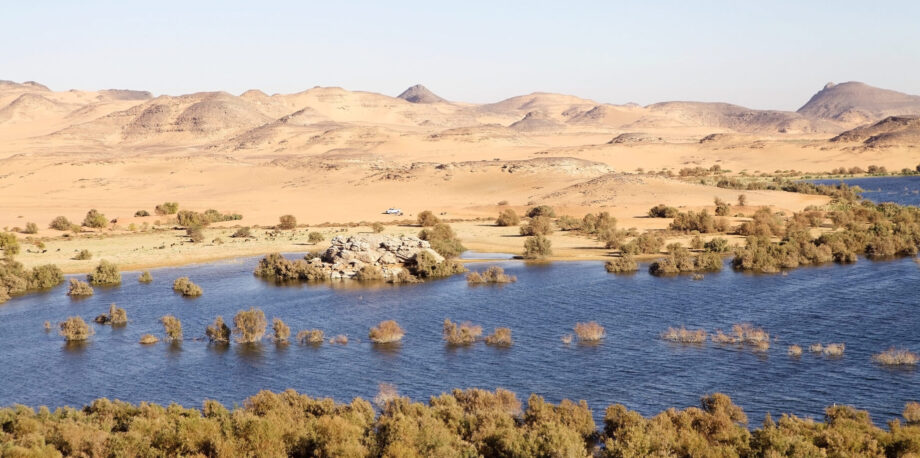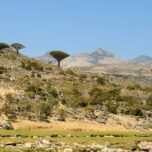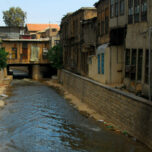September 25, 2024 —  Editor’s note: This story is part of a collaboration between Ensia and Egab, a media startup that helps young local journalists from across the Middle East and Africa get published in regional and international media outlets, with a focus on solutions journalism.
Editor’s note: This story is part of a collaboration between Ensia and Egab, a media startup that helps young local journalists from across the Middle East and Africa get published in regional and international media outlets, with a focus on solutions journalism.
When Egypt banned bird hunting in Lake Nasser last October, environmental groups celebrated. But for Mohammed Sayed, a boat owner in the southern city of Aswan, and at least another 100 boatmen working with five tourism companies operating in the lake, the decision served a considerable blow.
“Last year, we had around 11 bird-hunting trips in the lake, but now after the ban, all were canceled,” he says. Trips like these have supported Lake Nasser’s boat owners and their families. After that move, many found themselves in a difficult financial situation.
But despite being a significant source of income to members of the local community, unregulated hunting has ravaged migratory bird populations in the lake over the past decade, in part because boat owners guide nonnative hunters to nesting locations in the area, says Ekramy Abaseery, general manager of Southern Protectorates of Egypt.
A Clash of Interests
Extending some 5,000 square kilometers (1,930 square miles), Lake Nasser serves as a haven for millions of migratory birds traveling among Europe, Asia and Africa. During the migratory season, many birds descend upon the lake in search of sustenance. The fluctuation in water levels caused by seasonal flooding between summer and winter creates vast areas along the lake’s edges that harbor abundant plant life and provide rich environments for birds, according to Haitham Mossad, conservation director at Nature Conservation Egypt (NCE).
“While conducting the annual winter bird count in Lake Nasser, we usually encounter tourists actively hunting,” he says. “In some places, we’ve even come across cases of mass bird killings. I remember finding a pile of dead flamingos once.”
Over the past 15 years, extensive overhunting caused many migratory birds to stop nesting in the lake altogether, says Khaled Noby, head of NCE. He says that his group has discovered rare species such as flamingos, pelicans and yellow-billed storks in the smaller wetlands surrounding Lake Nasser, inaccessible to boats.
“Despite the lake being better suited to host these species, these smaller ponds have become safer nesting grounds,” he says.
The clash of interests and priorities has put authorities in Egypt in a dilemma, where officials must choose between the safety of the region’s biodiversity and the continued livelihoods of the local community, according to Abaseery.
“On one hand, we wanted to promote tourism and create activities for the residents around the lake and boat owners, but in the past few years, we have become more concerned with the depletion of the lake’s natural resources,” he says.
Recognizing the urgent need to protect the area, NCE collaborated with environmental authorities, successfully persuading the Ministry of Environment in October to ban hunting on the lake for the entire 2023–24 migration season. The decision offered respite to the area’s wildlife but also had unintended detrimental effects on the boat owners dependent on the hunting trips for 80% of their annual income.
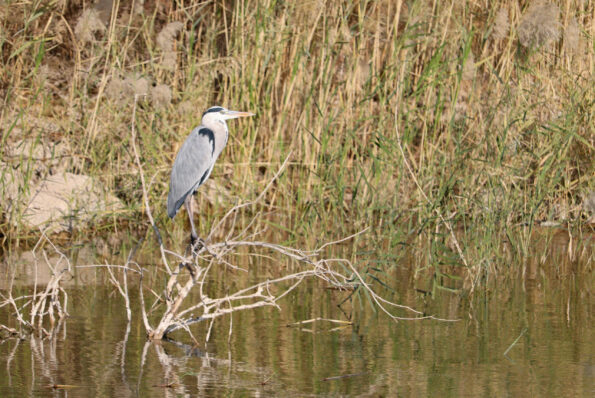
Unregulated hunting has ravaged migratory bird populations in Lake Nasser over the past decade. Photo by Ismael Khalifa
“As environmental specialists, we all know that nothing can recover in a day. For the environment to be destroyed, it might take an hour, but for it to recover, it could take years. Therefore, we need to wait for some years,” says Abaseery. Noby acknowledges the difficulty in gauging the ban’s immediate impact, but says, “If the [ban] holds, we are sure the birds will return.”
An Alternative to Hunting
Efforts are underway to promote birdwatching trips as an alternative to hunting. NCE, in collaboration with Sobek Planet, an ecotourism company based in Aswan, and the Southern Protectorates of Egypt, relocated their annual bird counting training site from Aswan to Lake Nasser, conducting a several-day birdwatching trip with one of the affected boat owners.
“We are trying to promote birdwatching trips. However, this is challenging to do quickly because we need more time to spread the word before next season,” Mossad explains.
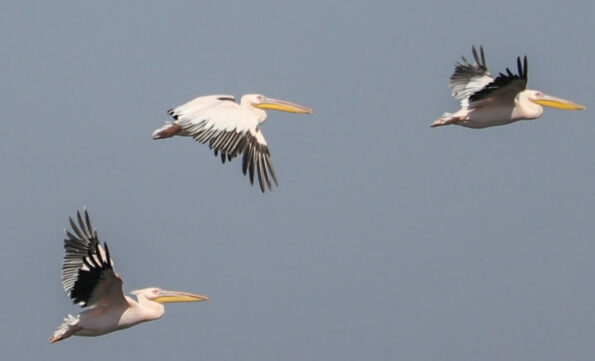
A hunting ban has offered respite to Lake Nasser‘s wildlife, but it has also had unintended effects on boat owners who depend on hunting trips for their income. Photo by Ismael Khalifa
As the owner of the boat used by the NCE, Sayed not only had the opportunity to contribute to the birdwatching trip but also attended an advanced bird counting training, where he learned to distinguish between different types of birds and observe them in the wild. This newfound knowledge enabled him to tap into a new source of revenue, albeit with less revenue than previous hunting trips, leading bird watchers into Lake Nasser’s nesting grounds.
“I benefited a lot because I didn’t know how to classify birds,” he says.
However, the absence of Maltese and other European tourists is one of many challenges facing Sayed and others dependent on the lake. Due to the lake’s location on the border between Egypt and Sudan, gaining access to its waters requires permission from various Egyptian governmental bodies.
“Now, to embark on a trip on the lake, whether for an overnight stay or just a day trip, one needs permits from multiple authorities,” says Amr Hady, an environmental researcher and the founder of Sobek Planet. “The cost of boats is high, and they are not easily accessible to everyone.” Hady says that since Lake Nasser was a well-known hunting destination, the companies taking tourists out for hunting trips had streamlined the process, but since birdwatching is a newer activity in the region, those taking part are not as efficient with the bureaucratic permitting process.
For Farah Kamel, managing partner at Dayma, another ecotourism startup that organizes educational trips across Egypt,the hunting ban and the NCE trip inspired a new vision for overnight birdwatching trips around the Lake Nasser area.
“We are actively planning and promoting sustainable trips that allow visitors to appreciate the lake’s natural beauty while ensuring a minimal impact on the environment.”
For the birdwatching community in Egypt, these trips offer a unique and important window to the diverse avian species that inhabit Lake Nasser and its surrounding wetlands.
“The trip was a dream come true for me,” says Ismael Khalifa, a passionate birdwatcher and wildlife photographer. “I never realized the vastness of Nasser Lake, and on our first day, I had the pleasure of spotting a new bird from my wish list — the African pied wagtail.”
Related Posts
Ensia shares solutions-focused stories free of charge through our online magazine and partner media. That means audiences around the world have ready access to stories that can — and do — help them shape a better future. If you value our work, please show your support today.
Yes, I'll support Ensia!